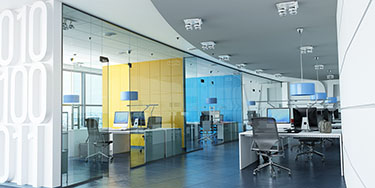|
Subscribe / Renew |
|
|
Contact Us |
|
| ► Subscribe to our Free Weekly Newsletter | |
| home | Welcome, sign in or click here to subscribe. | login |
Architecture & Engineering
| |
May 28, 2020
McKinstry launches service to help buildings safely reopen
Journal Staff Reporter
Seattle-based McKinstry has launched a service it said is designed to help owners and operators ensure their buildings are ready to safely reopen after shutdowns due to the COVID-19 pandemic.
With its new “Return with Confidence” service, McKinstry said it will provide a free phone consultation. For a fee, it will then provide an assessment and detailed action plan for reopening based on each building’s needs.
The national engineering, construction and energy services firm has seen robust interest in the service, said Ash Awad, its chief market officer.
“Everybody’s going to need a plan to figure out how to bring people back to buildings,” he said.
During the pandemic, many buildings have sat empty or operated at limited capacity. Reopening requires procedures to ensure the health and safety of occupants, McKinstry said. Even buildings that have remained operational need to be assessed, re-tuned and reprogrammed to minimize the spread of illnesses like COVID-19, it said.
For instance, Awad said in unoccupied buildings, water can stagnate in the conveyance systems, which could cause disease.
McKinstry will evaluate indoor air quality, ventilation, temperature, humidity, mechanical systems and water quality following the guidance of regulatory and industry groups. That will provide the basis for a plan for building staff to follow to maximize occupant health and safety, it said. Or McKinstry can perform the work.
The plan may also include measures to reassure occupants on steps taken to prevent the spread of viruses and bacteria, from building signage to dashboards that remind them to follow proper social distancing and handwashing protocol and to wear proper protective equipment.
For instance, hospitals, clinics and doctors offices are seeing significant loss of revenue as people delay elective procedures and visits as they are afraid they will come out sick, Awad said. Medical facilities “want to be able to advertise that they have done everything they can,’’ he said.
In Spokane, McKinstry evaluated the zero energy, zero carbon building, called Catalyst, that it is developing in partnership with Avista Utilities. The 159,000-square foot building is slated to open in September, and Eastern Washington University is leasing 100,000 square feet for the computer science, electrical engineering and visual communication design programs, which will bring about 1,000 students to the building.
McKinstry said the evaluation included a plan to ensure the ventilation systems are operating with 100% fresh air, with no recirculation, while keeping the building energy efficient; to create the right amount of seating in classrooms; to repurpose some conference rooms for small group discussions; to add wayfinding for proper people movement; and to use existing building technology to monitor the people count.
“It’s very disconcerting to imagine bringing all these students back” without a plan, said Awad.
He said the new service is modeled after safe construction site practices McKinstry uses and is employing to reopen its own offices, especially in Seattle. He said tech companies use a phrase, “eat your own dog food,” which means before you send something into the marketplace make sure you test it on yourself, and that’s what his firm did.
Awad said the U.S. has 88 billion square feet of non-residential space, including, schools, offices, retail, industrial, government and hospitality. However, some of those buildings don’t have the most contemporary electronics, controls or systems needed for proper air handling and measuring the quality of air entering and circulating especially in light of COVID-19 to help prevent contaminated droplets from floating in the air and to help pull out contaminants. “There are going to be some building owners who really struggle with what to do here,” he said.
In other buildings McKinstry can change the controls on mechanical systems to let more fresh air in. However, owners need to ensure those changes don’t increase energy costs too much. “We don’t want to change the operation of a building so dramatically that we have unintended consequences,” he said.
McKinstry expects the immediate market for it new service will be offices, K-12 schools, colleges and hospitals — buildings needed to “get America running again” Awad said.
However, he said it is important to understand that his firm will not be attesting that operational changes it makes in buildings will rid them of a virus or completely eliminate the virus. “We’re not offering a cure.”
The firm said people can schedule the consultation at https://tinyurl.com/ybl97ckg or by calling (855) 936-2554.
Lynn Porter can be
reached by email or by phone
at (206) 622-8272.



